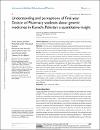Understanding and perceptions of final-year Doctor of Pharmacy students about generic medicines in Karachi, Pakistan: a quantitative insight
| Author | Jamshed, Shazia Qasim |
| Author | Ibrahim, Mohamed Izham Mohamed |
| Author | Hassali, Mohamad Azmi |
| Author | Sharrad, Adheed Khalid |
| Author | Shafie, Asrul Akmal |
| Author | Babar, Zaheer-Ud-Din |
| Available date | 2016-11-14T07:58:55Z |
| Publication Date | 2015-05-15 |
| Publication Name | Advances in Medical Education and Practice |
| Identifier | http://dx.doi.org/10.2147/AMEP.S27762 |
| Citation | Jamshed SQ, Ibrahim MIM, Hassali MA, Sharrad AK, Shafie AA, Babar Z-U-D. Understanding and perceptions of final-year Doctor of Pharmacy students about generic medicines in Karachi, Pakistan: a quantitative insight. Advances in Medical Education and Practice. 2015;6:359-366. |
| Abstract | General objective: To evaluate the understanding and perceptions of generic medicines among final-year Doctor of Pharmacy students in Karachi, Pakistan. Methods: A 23-item survey instrument that included a question on the bioequivalence limits and Likert-type scale questions regarding the understanding and perceptions of generic medicines among the students was executed. Cronbach’s alpha was found to be 0.62. Results: Responses were obtained from 236 final-year Doctor of Pharmacy students (n=85 from a publicly funded institute; n=151 from a privately funded institute). When comparing a brand-name medicine to a generic medicine, pharmacy students scored poorly on bioequivalence limits. More than 80% of the students incorrectly answered that all the products that are rated as generic equivalents are therapeutically equivalent to each other (P<0.04). Half of the students agreed that a generic medicine is bioequivalent to the brand-name medicine (P<0.001). With regard to quality, effectiveness, and safety, more than 75% of the students disagreed that generic medicines are of inferior quality and are less effective than brand-name medicines (P<0.001). More than 50% of the students disagreed that generic medicines produce more side effects than brand-name medicines (P<0.001). Conclusion: The current study identified a positive perception toward generic medicines but also gaps in the understanding of generic medicines. Pharmacy students lacked a thorough understanding of the concepts of bioequivalence. Pharmacy academia should address these issues, which will help build confidence in generic medicines and increase the generic medicine use in Pakistan. |
| Language | en |
| Publisher | Dove Press |
| Subject | safety Curriculum efficacy |
| Type | Article |
| Pagination | 359-366 |
| Volume Number | 6 |
| ESSN | 1179-7258 |
Files in this item
This item appears in the following Collection(s)
-
Pharmacy Research [1357 items ]


